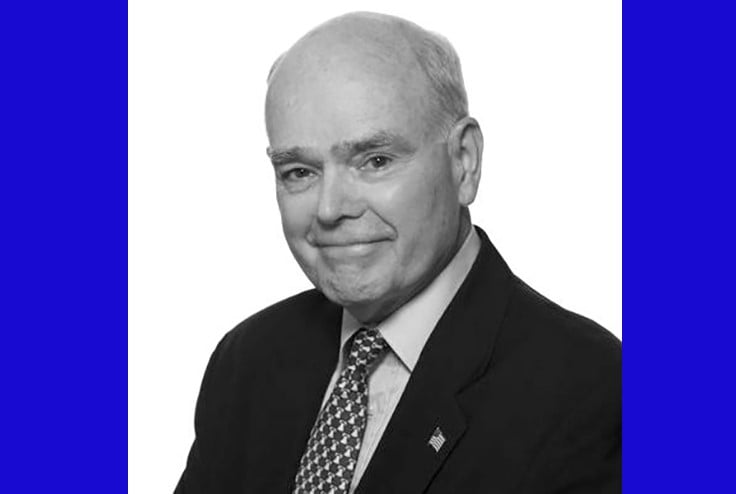No one who knew Lee Edwards was surprised to hear the news that the scholar, author, and indefatigable historian of the postwar conservative movement died Dec. 11.
At 92, he had been in declining health for several months and, almost two years to the day his beloved wife Anne died, it was only a matter of time before Edwards would join her.
But that did not diminish in any way the sorrow for the man who wrote 25 books on the conservatism that was born with Barry Goldwater and the Arizona senator’s nomination for president in 1964, went into action through Ronald Reagan’s presidency (1980-88), was revived with the Republican capture of Congress led by Newt Gingrich, and lives on in just about every Republican elected official today.
Had Dr. Lee Willard Edwards had only a few more years, friends and admirers speculated, it was almost inevitable he would have been writing of and explaining the latest hybrid of conservatism—the MAGA movement—and who besides Donald Trump it was exemplified by.
If anyone was born to the job of writing the history of conservatism, it was Lee Edwards. His father Willard Edwards was the longtime Washington correspondent for the Chicago Tribune, for decades a decidedly right-of-center publication.
Lee loved to show a photograph of his frowning father standing feet away from the podium of the 1940 Democratic National Convention as First Lady Eleanor Roosevelt admonished delegates to nominate leftist Secretary of Agriculture Henry Wallace as her husband’s vice-presidential running mate.
“Dad couldn’t stand any of them—Franklin, Eleanor, or Wallace,” the young Edwards told Newsmax with his signature twinkle in his eye.
With 1950s Washington still much like a small town without huge staffs to serve as barriers between lawmakers and reporters, Lee Edwards could bring to life reminiscences of former Sen. Joe McCarthy (R-Wis.), anti-Communist crusader of the 1950s, coming to his home to private share a scoop with Willard—armed with steaks he would fry and Scotch and other forms of libation that the senator and the reporter would eagerly consume.
Lee Edwards earned his undergraduate degree at Duke University and his Ph.D. in Political Science at Catholic University. In between, he studied at the Sorbonne in Paris. Dr. Elizabeth Spalding, Edwards’ daughter, said the contemporaneous “crushing of the Hungarian uprising [in 1956] and the plight of [imprisoned] Cardinal [József] Mindszenty made him angry; he vowed to do whatever he could to free people from Communism.”
Edwards worked on the staff of stalwart conservative Sen. John Marshall Butler (R-Md.) and worked round-the-clock shifts with him during the Cuban Missile Crisis of 1962. He was one of the signers of the Sharon Statement that launched the conservative Young Americans for Freedom (YAF) and was one of the early editors of its magazine New Guard.
Like most young conservatives of his time, Edwards’ true hero was Barry Goldwater. He vigorously cheered at the “Draft Goldwater” rally at Madison Square Garden in 1963 and went on to be news director of the “Draft Goldwater Committee” and eventually an assistant press secretary on the Goldwater campaign of 1964.
Devastated by the size of his hero’s defeat at the hands of Lyndon Johnson, Edwards, and his friends on the right soon saw that their ideas and ideology were given a new lease on life by a new political figure—Ronald Reagan. No sooner had Reagan become governor of California in January of 1967 than his first-ever biography, Ronald Reagan: A Political Biography, was published.
Edwards went on to publish biographies of his friend and early mentor William F. Buckley, Jr. and of Walter Judd—his congressman who spoke out against Communism in China after doing medical work there in the 1930s. His eponymous biography of Goldwater won widespread praise for not being a hagiography but an insightful look at what led to one of the founding fathers of modern conservatism also clashing with fellow leaders on the right in his later years.
Much like Buckley and other right-of-center icons such as Dr. Russell Kirk and journalist-author M. Stanton Evans, Edwards was eagerly sought out by young conservatives at such regular forums as the Conservative Political Action Conference and the Philadelphia Society (of which Edwards served a term as president).
His books and attendance at conservative conclaves notwithstanding, Edwards always sought to motivate the young in the classroom. He was an adjunct professor of politics at Catholic University and the Institute of World Politics and a distinguished fellow in conservative thought at the Heritage Foundation.
“I first met Dr. Edwards when I took his Mass Media and American Politics class at Catholic University in the spring of 1989,” recalled Kevin McVicker, partner in the Shirley-McVicker public relations firm, “He was a gifted instructor who inspired us to learn about who was reporting the news as well as what was being reported.
“Who knew it would lead me to a career?”
But Lee Edwards’ proudest achievement came in 2022, as he and fellow anti-Communists finally brought to life the Victims of Communism Museum. A work-in-progress for more than 20 years, the Washington, D.C.-based museum—along with the nearby Victims of Communism Memorial, also shepherded by Edwards—honors the 100 million who perished under the ham-handed rule of Communist tyrants in Russia, China, North Korea, Eastern Europe, Cuba, and throughout Southeast Asia.
One could say that having grown up in close proximity to the movement he would chronicle, Edwards was present at the creation. He saw it all and wrote it all down. In so doing, he left a legacy for future generations to see and understand how a cause could grow and change the world.
Lee Edwards’ legacy is a rich one and will surely live on.
Editor’s Note: A version of this article first appeared at Newsmax

Leave a Reply